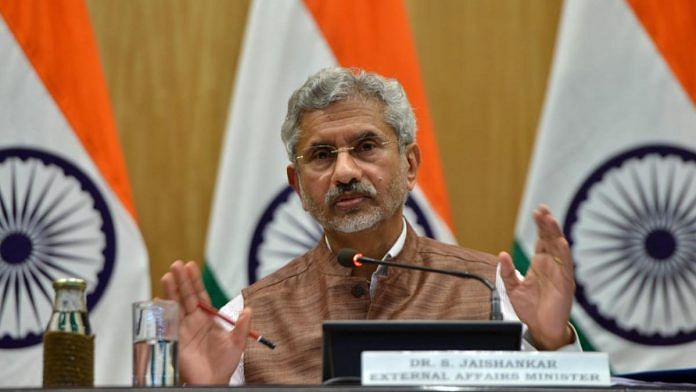New Delhi: While India today faces “very different” national security challenges, it continues to witness some “perennial problems” in terms of cross-border terrorism, said External Affairs Minister S. Jaishankar Sunday, taking a dig at Pakistan.
On the nineteenth anniversary of the deadly terrorist attack on Parliament in 2001, the External Affairs Minister said, “The national security challenges faced by this rising India are also going to be very different. At one level some of the more perennial problems associated with our national consolidation and development will continue. In particular, a long-standing political rivalry is expressed today as sustained cross-border terrorism by a neighbour.”
Jaishankar, while delivering the Second Manohar Parrikar Memorial Lecture, noted, “In some case, activities of some insurgent groups needs to be continuously monitored and neutralised. But the world is a competitive place and India’s rise will evoke its own reactions and responses. There will be attempts to dilute our influence and limit our interests. Some of the contestation will be directly in the security domain, others could be reflected in economic, connectivity, even in societal context.”
His remarks follow Prime Minister Narendra Modi’s tribute to security personnel who laid down their lives in the 2001 Parliament terror attack, where he said that India will “never forget the cowardly attack”.
In his address, Jaishankar also said that the era of unconstrained military conflicts may be a thing of the past and the “the reality of limited war and coercive diplomacy is still very much a fact of life.”
“India matters more and our world views must process that in all its aspects. Our work style and mindset must adjust to the raise the level of our game … Visualising and realising to a new range of national security complexities require the willingness to continuously review policy and audit performance,” he said.
Also read: LAC stand-off a result of China ‘violating’ bilateral agreements, says MEA
Conceptual change in India’s foreign policy since 2014
Referring to the Modi government’s ‘Neighbourhood First’ policy and New Delhi’s bilateral ties with the Gulf countries, Jaishankar noted that since 2014 the country’s foreign policy has witnessed a “conceptual change”.
In terms of neighbourhood first, he said, the government’s approach envisaged a “generous and non-reciprocal engagement of neighbours that was centred around connectivity, contacts and cooperation”.
However, the minister noted that this has happened by a greater understanding of “mutual sensitivity and mutual respect for each other’s interest” in the immediate neighbourhood.
Lauding former defence minister Manohar Parrikar, the External Affairs Minister said that the former understood the growing synergies between India’s defence needs and diplomatic relationships.
Jaishankar also acknowledged Parrikar’s role in building India’s relationship with the US, France and Russia.
Also read: No consensus at WTO on India, South Africa’s proposal to waive IP rights on Covid vaccines
Foreign policy today ‘securitised’
Jaishankar also noted that today India’s “foreign policy has got more securitised and defence policy more strategised”.
“The interplay between diplomacy and defence policy has been visible actually from the early days of our independence,” he said.
Talking about large-scale defence imports from Russia to the US, Jaishankar said, this has been made possible due to India’s diplomatic skills.
“It is no accident that the resumption of India-US defence trade took place in parallel to the evolution of the India-US nuclear deal…The possibility of India participating in global defence supply chains has come closer to reality,” he said.
He also lauded the fact that India’s maritime domain awareness has further developed through partnerships.
Jaishankar added that Indian military can be an “extremely effective platform” to “advance diplomatic goals” of the country even in situations that are not conflict related.
Also read: Indian envoy meets Bangladesh PM Sheikh Hasina as Dhaka, Islamabad look to revive ties



